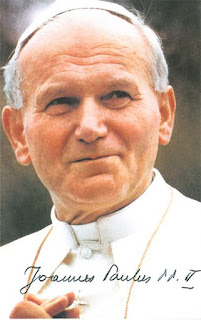 |
Pope Saint John Paul II. the Great
(Saint Karol Józef Wojtyła)
/1920-2005/
Photo credit:
|
(PL) „Mówi się słusznie o prawach człowieka. Podkreśla się, zwłaszcza w naszej epoce, znaczenie tych praw. Nie można jednakże zapomnieć, że prawa człowieka są po to, ażeby każdy miał przestrzeń potrzebną do spełniania swoich zadań i powinności.”
(HU) „Jogosan beszélünk az emberi jogokról. Fontosságuk ki van hangsúlyozva, főleg korszakunkban. Azonban nem szabad elfelejteni, hogy az emberi jogok azért léteznek, hogy mindenkinek meglegyen a szükséges tere a feladatai és kötelezettségei teljesítésére.”
(EN) “We rightly speak of human rights. Their importance is emphasized, especially in our age. It cannot be forgotten, however, that human rights exist so that everyone has the space necessary for the fulfillment of their duties and obligations.”
(IT) „Si parla giustamente dei diritti dell’uomo. Si sottolinea, specialmente nella nostra epoca, la loro importanza. Non si può tuttavia dimenticare, che i diritti dell’uomo esistono affinché ognuno abbia lo spazio necessario l’adempimento dei propri compiti e obblighi.”
(Gdańsk/Danzig/Danzica, 12. 06. 1987. 06. 12.)

